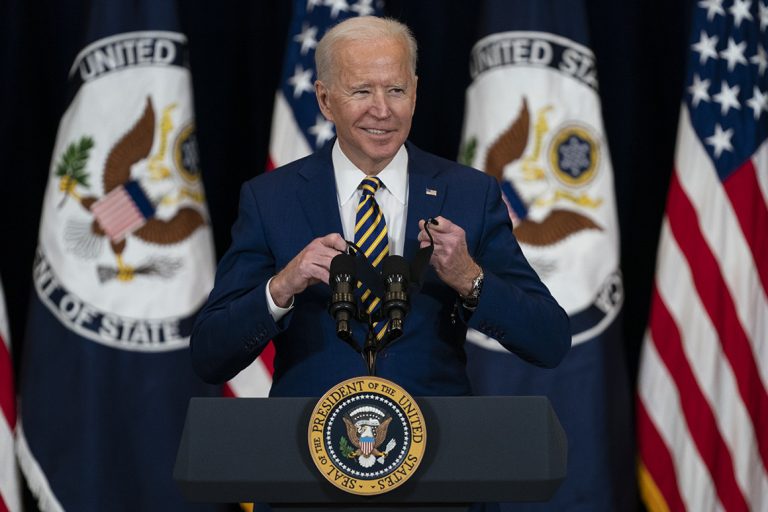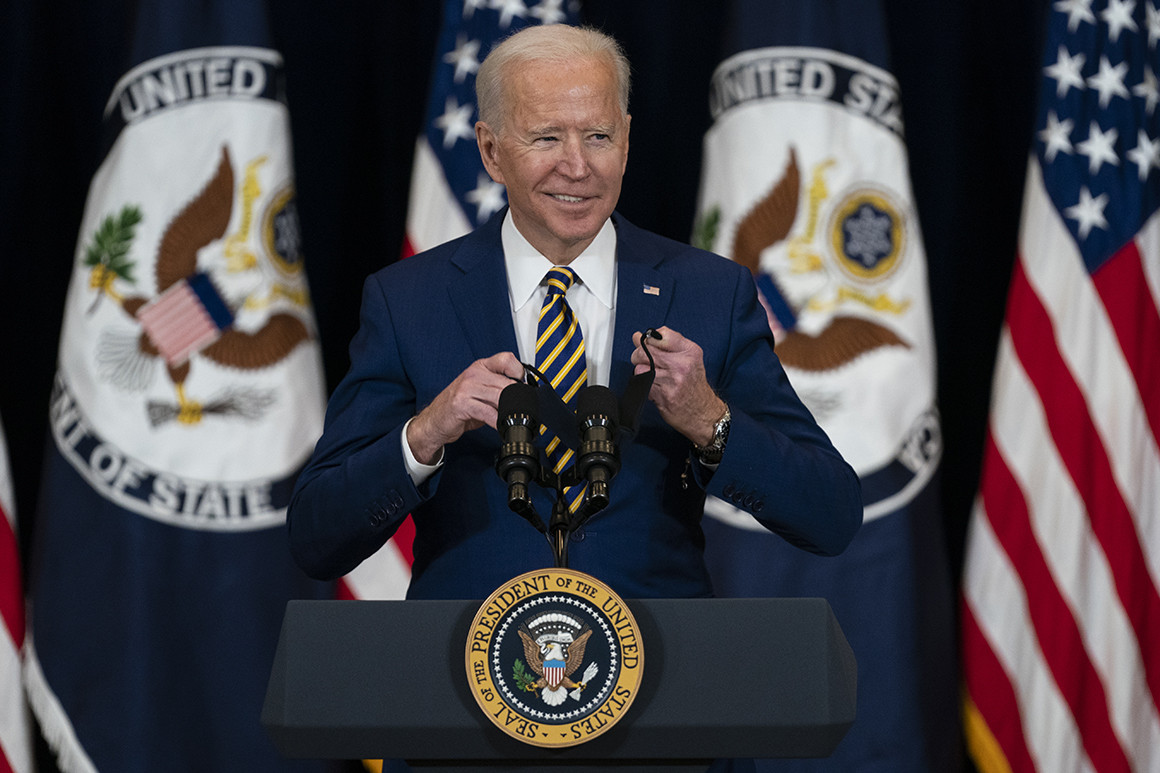
 Big changes are coming up in America’s Middle East policy. The Biden Administration will not have the same relationship with Israel. American aid to the Palestinians is also being restored
Big changes are coming up in America’s Middle East policy. The Biden Administration will not have the same relationship with Israel. American aid to the Palestinians is also being restored
By Tom Arms
Big changes coming up in America’s Middle East policy and that won’t all be universally applauded. Saudi Arabia, Iran, Syria, Iraq and Israel are already feeling the difference.
This week’s American attack on Syrian-based and Iranian-backed militias may on the surface seem like a continuation of the Trump Era’s unilateralist shoot-from-the-hip America first and only policy. But an examination of the press statement that followed the retaliatory action indicates otherwise.
The Pentagon went out of its way to thank the Iraqi government for its intelligence input and stressed the strike was only conducted after “full consultations” with its “partners and allies.”
On top of that, the Biden Administration has sought the help of the EU in brokering a deal to revive the Iran Nuclear Accord and, of course, the deal itself is a multinational package to deal with the threat of a nuclear-armed Iran.
However, Washington’s two closest regional allies—Israel and Saudi Arabia—will be none too pleased with Biden’s plans to start talking again with Tehran. They both took the lead in pressuring the Trump Administration to walk out of the nuclear accord and stiffen economic sanctions against Iran.
Saudi-Iranian rivalry for control of the Persian Gulf is ages old. It has been exacerbated in recent years by Iranian-backing for anti-Saud Houthi rebels in Yemen. And then, of course, the two countries are respective leaders of the rival Sunni and Shia factions of Islam.
Iran is also the biggest threat to Israel. And for the Trump Administration unquestioning support for Israel was a cornerstone of its foreign policy. Donald Trump moved the US embassy to Jerusalem, recognized Israeli control of the Golan Heights, cut off aid to the Palestinians, abandoned the two-state solution and supported Israeli settlements on the West Bank.
The Biden Administration will not have the same relationship with Israel. The new president demonstrated it by taking 27 days to make a courtesy call to Prime Minister Benjamin Netanyahu. In the call, Biden made some unpalatable facts known. For a start, American aid to the Palestinians is being restored. Next, that the two-state solution is back on the table and Biden wants a resumption of talks between the Palestinians and Israel. Third, Israeli settlements and proposed annexation of The West Bank are—despite what ex-Secretary of State Mike Pompeo said—contrary to international law.
Finally, Joe Biden stressed that he would not countenance Israeli interference in American domestic politics. Benjamin Netanyahu has made no secret of his love for Donald Trump, and has appeared on public platforms in the US to support him and other leading Republicans. This is now a no-no.
Telephone diplomacy was also employed by Biden for a “recalibration” in relations with Saudi Arabia. In this instance he pointedly went over the head of Crown Prince Mohammed bin Salman (MBS) to deal directly with 85-year-old King Salman. This is a major blow to the prestige of MBS who enjoyed a close relationship with Donald Trump and his son-in-law Jared Kushner. It was a two-way street. The Saudis provided quiet diplomatic support to Trump’s Arab-Israeli peace plan and spent billions on American weapons. The Trump Administration turned a blind eye to MBS’s appalling human rights record and supported his genocidal war in Yemen.
Biden basically told King Salman that his crown prince was a murderer. That the CIA had proof that MBS had ordered the assassination and dismemberment of Washington Post columnist Jamal Khashoggi in October 2018. Furthermore, that The US would no longer support Saudi Arabia’s war in Yemen and wanted to see the release from prison of hundreds of dissenting Saudi royals, clerics, journalists, rights activists and businessmen.
Little, if any, of the above will be welcomed by American conservatives. Unquestioning support for Israel is a sacred cow. Palestinians want land claimed by Israel and so Trump’s marginalization of the Palestinians was applauded. Iran threatens Israel and so Trump’s hard line towards Tehran was enthusiastically backed. Saudi Arabia was a traditional foe of Iran so support for Riyadh was nourished.
 World Review
World Review
- President Joe Biden must have mixed feelings about the public’s continued fascination with the Donald Trump story. On the one hand it is a distraction from his own agenda and on the other, it allows him to move forward quickly and efficiently while attention is largely engaged elsewhere. He is doing the latter. This weekend Biden will celebrate 50 million covid-19 vaccinations, putting his administration well ahead of the target 100 million jabs in 100 days. He is also expected to shortly push through Congress a third major pandemic spending package. This one is worth $1.9 trillion and will focus on the poor minorities and women. The only part of the deal which has won Republican approval is $110 billion for business support. Meanwhile, Trump’s problems continue to make headlines. The biggest is that the US Supreme Court has refused the ex-president’s appeal to block a subpoena to obtain Trump’s tax records for the past ten years. Cyrus Vance Jr., the South Manhattan District Attorney leading the charge, believes that the records will reveal massive fraud involving taxes, bank dealings and insurance. Trump has denounced the investigation as part of the continuing “deep state” “witch hunt” and is keeping the Republican spotlight shining on him with a keynote speech this Sunday at a meeting of the Conservative Political Action Committee (CPAC) In Orlando, Florida. His strongest Senate supporter, Lindsey Graham, said Trump “is going to dominate the Republican Party for years to come.”
- Prime Minister Boris Johnson must have mixed feelings about the coronavirus pandemic. More than 100,000 deaths, a locked-down economy and a crippling debt is bad news. But at least it is deflecting public attention away from his disastrous Brexit deal. The biggest problems this week have been predicted and predictable—fishing and Northern Ireland. The EU’s Common Fisheries Policy which made British waters part of a larger European lake open to all EU fishermen was one of the main reasons for Brexit. The problem is that the deal Boris Johnson has struck with Brussels has possibly worsened the plight of the British fishermen. At the root of the issue is the fact that the fish that are caught in British waters appeal to European palates and those netted in European seas appeal to hungry Brits. And because of various quota and hygiene regulations now in place it is becoming difficult to impossible to land fish in each other’s ports. Then there is Northern Ireland with the new trading border in the Irish Sea. This is to keep open the border between the northern and southern halves of the island of Ireland and, hopefully, avoid a return to “The Troubles” of the last quarter of the 20th century. But this means import and export controls between Northern Ireland and the rest of Great Britain. The British government has responded by proposing that the uncontrolled period of trade between Northern Ireland and mainland Britain be extended to 2023. That is unacceptable to Dublin and Brussels. Any restrictions in trade links between Northern Ireland and the British mainland are unacceptable to the protestant Democratic Unionist Party (DUP) who want the current Northern Ireland Protocol jettisoned and a hard border drawn between Eire and Northern Ireland. This, of course, would torpedo the Good Friday Agreement and re-open the prospect of a return to intercommunal fighting.
- China is in a quandary over Myanmar. It wants stability on its border with the Chinese province of Yunnan. It is also wants to protect its multi-billion dollar investment in the deep-water port of Kyaukpyu. There is also the issue of safeguarding the interests of 1.6 million Chinese living in Myanmar and at the same time appear consistent in its policy of non-interference in the domestic affairs of other countries. Basically, Beijing and Xi Jinping don’t care who is in power in Myanmar as long as they don’t threaten Chinese economic and geopolitical interests and their rule keeps angry crowds off the streets. The problem is that the military is failing in the latter task. Thousands continue to demonstrate in protest against the 1 February military coup which overthrew 75-year-old de facto leader Aung San Suu Kyi. Most of the international community has called for UN sanctions against the new regime, but these have been blocked by China. Not because the Chinese government loves generals, but because it doesn’t want to rock the Burmese boat. Beijing has invested heavily in the port and special economic zone of Kyaukpyu which is a key link in its “string of pearls” which performs the dual role of a seaborne economic link to the Middle East and Africa and the geostrategic task of encircling regional rival India. But perhaps more important is adherence in Beijing’s strict policy of non-interference in the domestic affairs of third countries. This is an essential element of Chinese foreign policy as it helps China to fend off criticisms of its own human rights abuses.
- The German conviction this week of Syrian torturer Eyad al Gharib highlights the determination of German prosecutors to employ the little-used legal principle of “Universal Jurisdiction.” This judicial tool dates back to a 1949 Geneva Convention which says that States have the right—nay, the obligation—to prosecute people on their territory who have committed unspeakable acts in other countries such as torture and crimes against humanity. Eyad al-Gharib was a small cog in the Syrian torture machine known as General Intelligence Directorate (GID). That is why his prison sentence is only four and a half years. Another reason is that he is giving evidence against 58-year-old Anwar Raslan, a former mainspring in the GID who is alleged to have tortured, murdered, raped or sexually assaulted 4,000 victims. He is facing life imprisonment. Although al-Gharib was a relative small-fry, his trial stretched to several weeks to allow dozens of witnesses to give hundreds of hours of testimony. Their evidence will be used to convict Raslan and be made available to state prosecution services in other countries so that they can bring actions against any other Syrians who have committed state-sponsored crimes and then sought refuge in their jurisdiction. The Germans are, of course, taking the lead on the issue of universal jurisdiction as partial atonement for their own sad history.
- A victory for Chinese feminists this week. A Beijing divorce court ruled that a husband had to pay his ex-wife for her duties as a housewife. Mr. Chen was told to cough up $7,700 as a one-off payment for Ms. Wang’s five years of housework, childcare and looking after elderly parents. He also has to pay her $300 a month in maintenance. This is a landmark ruling in China because the Chinese—to put it bluntly—are one of the world’s most patriarchal societies. Their emphasis on the male sex is based on the need for strong men to produce food in agricultural work and has been reinforced over the years by the tenets of Confucianism and Taoism. The Chinese Communist Party also played its role in stiffening Chinese society’s patriarchal leanings with its one child policy from the late 1970s to 2016. It provided extra compensation for families with one daughter and in rural areas it allowed families to have a second child if their first was a baby girl. The legacy is a demographic male-female imbalance with roughly 119 boys to every 100 girls. Ms. Wang, it seems, will have little trouble finding a new husband.
_______________________
About the Author
 Tom Arms is the London-based American foreign affairs journalist. He has nearly half a century’s experience of world affairs, and has written and broadcast for American, British and Commonwealth outlets. Positions he held included foreign correspondent, diplomatic correspondent, foreign editor, editor and founding CEO of an international diary news service. He is the author of “The Encyclopedia of the Cold War,” “The Falklands Crisis” and “World Elections on File.” His new book “America: Made in Britain” is expected this year.
Tom Arms is the London-based American foreign affairs journalist. He has nearly half a century’s experience of world affairs, and has written and broadcast for American, British and Commonwealth outlets. Positions he held included foreign correspondent, diplomatic correspondent, foreign editor, editor and founding CEO of an international diary news service. He is the author of “The Encyclopedia of the Cold War,” “The Falklands Crisis” and “World Elections on File.” His new book “America: Made in Britain” is expected this year.
{The views expressed in this article belong to the author and do not necessarily reflect the editorial policy of Sindh Courier}